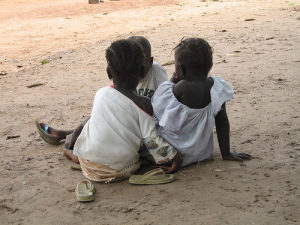Time to Deliver: Series on Maternal, Newborn and Child Health in sub-Saharan Africa
In June PLoS Medicine launched a series on maternal, newborn and child health in sub-Saharan Africa. Two Policy Forums and an Editorial were published on June 21st to coincide with the Pacific Health Summit (a high profile meeting of decision-makers in science, policy, industry and medicine), which this year addresses the theme of maternal and newborn health.
The series is based on consultations with 60 scientists and policy makers from nine countries. It provides a snapshot of maternal, newborn, and child health in sub-Saharan Africa, review evidence-based solutions, and identify high-impact opportunities for reducing maternal and child mortality.
The first two articles analyse the current status of maternal, newborn, and child health in Africa, and identify which interventions hold the greatest potential in varying countries to prevent the nearly 4.7 million mothers, newborns, and children deaths that occur each year in sub-Saharan Africa. In the first article, Joy Lawn and colleagues outline where and why deaths among mothers and children occur and provide new data on the current coverage, quality, and equity in health interventions to prevent these deaths. In the second article, Robert Black and colleagues report on a priority setting analysis for 42 countries and indicate which interventions should be implemented to save mother’s and children’s lives now.
An Editorial, coinciding with the series, argues that action on maternal health must focus on increasing access to family planning resources as much as it does access to basic medical care.
Articles in the series will be published on a weekly basis until 13th July. This blog will provide a collection point for articles in the series, which will be listed below as they are published:
Published 21st June:
Joy Lawn and colleagues Sub-Saharan Africa’s Mothers, Newborns, and Children: Where and Why Do They Die? PLoS Med 7(6): e1000294. doi:10.1371/journal.pmed.1000294
Robert Black and colleagues Sub-Saharan Africa’s Mothers, Newborns, and Children: How Many Lives Could Be Saved with Targeted Health Interventions? PLoS Med 7(6): e1000295. doi:10.1371/journal.pmed.1000295
The PLoS Medicine Editors Maternal Health: Time to Deliver. PLoS Med 7(6): e1000300. doi:10.1371/journal.pmed.1000300
Published 29th June:
Sara Bennett and Freddie Freddie Ssengooba Closing the Gaps: From Science to Action in Maternal, Newborn, and Child Health in Africa. PLoS Med 7(6): e1000298. doi:10.1371/journal.pmed.1000298
Published 6th July:
Valerie A. Snewin and colleagues Improving Implementation: Building Research Capacity in Maternal, Neonatal, and Child Health in Africa. PLoS Med 7(7): e1000299 doi:10.1371/journal.pmed.1000299
Published 13th July:
Igor Rudan and colleagues Evidence-Based Priority Setting for Health Care and Research: Tools to Support Policy in Maternal, Neonatal, and Child Health in Africa. PLoS Med 7(7): e1000308. doi:10.1371/journal.pmed.1000308


[…] in patients in South African hospitals Posted on June 25, 2010 by katieplos As well as the series on mother, newborn and child health in sub-Saharan Africa launched on Monday, this week saw the publication of two research papers in PLoS […]
[…] Our series on maternal, neonatal, and child health in sub-Saharan Africa continues with Valerie Snewin and colleagues discussing the challenges of implementation and research capacity in Africa and the need for stronger research systems to reach maternal and child health goals. See the earlier blog about the series with all articles which lists all the articles as they are pub…. […]
I am currently undertaking a MPH course at the University of Nairobi and interested in researching and studying more on Maternal, neonatal and child health related issues; especially on why we have very poor statistics in Kenya despite the strides and investments being put in health care by the government and international bodies. My main interest is in adolescent reproductive health. Would you be having any related material in this sector?
Thank you.
[…] Lastly, as part of our continuing series on maternal, neonatal, and child health in sub-Saharan Africa, Igor Rudan and colleagues discuss various priority-setting tools for health care and research that can help develop evidence-based policy. See the earlier blog about the series with all articles which lists all the articles as they are pub…. […]
[…] Our series on maternal, neonatal, and child health in sub-Saharan Africa continues with Valerie Snewin and colleagues discussing the challenges of implementation and research capacity in Africa and the need for stronger research systems to reach maternal and child health goals. See the earlier blog about the series with all articles which lists all the articles as they are pub…. […]
[…] well as the series on mother, newborn and child health in sub-Saharan Africa launched on Monday, this week saw the publication of two research papers in PLoS […]
[…] Lastly, as part of our continuing series on maternal, neonatal, and child health in sub-Saharan Africa, Igor Rudan and colleagues discuss various priority-setting tools for health care and research that can help develop evidence-based policy. See the earlier blog about the series with all articles which lists all the articles as they are pub…. […]
Hiya, I’m really glad I’ve found this info. Today bloggers publish only about gossips and web and this is actually irritating. A good blog with exciting content, that is what I need. Thanks for keeping this web-site, I will be visiting it. Do you do newsletters? Can not find it.
Hi Keliones,
Probably the easiest way to follow us is on Twitter: @plosmedicine
Cheers
Paul